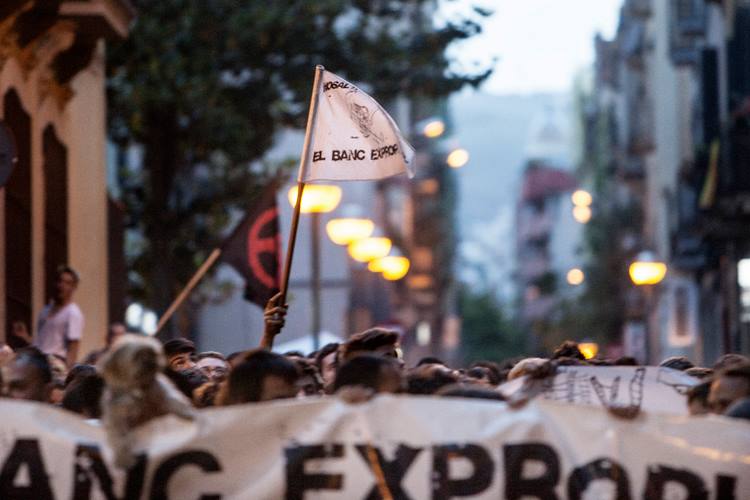
by Marina Rubio Herranz and Sam Bliss
The Banc Expropiat is an assembly-based project that has made the political decision not to delegate its communication task to any kind of media in order to keep its message accurate. First hand declarations and statements can only be found in the Banc’s twitter account and blog. Our views are our own.
On Monday May 23rd, the Catalan police evicted a beloved community space in Barcelona called the Banc Expropiat. Activists first occupied the abandoned former branch of the bank Caixa Catalunya in 2011, and during the last 5 years it has become a social center for the neighborhood of Gràcia.
The Banc serves as a shared space for organizing free activities open to all—from English and Catalan classes to tai chi sessions, from film screenings to meetings of the neighborhood assembly, from groups working on housing accessibility to sewing and drawing workshops. The Banc has a play area for kids, a free shop filled with donated clothes, and computers with internet for public use. It provides a place to share empowering skills and ideas outside the world of hierarchies, markets, political parties, or other formalized institutions. The property now belongs to a real estate speculator, Manuel Bravo Solano, who asked for the eviction.
With some of our closest friends, we participate in a group called the Xarxa d’Aliments, in which we ‘recycle’ leftover and unsellable food from local businesses to feed ourselves. In return, we help out the bakeries, market stalls, and fruit-and-veggie shops from which we collect when they need a hand, building a network of mutual support.
We would meet in the Banc once a week to discuss local food politics, organize big, free community meals, and part out the rescued fruits, veggies, bread and other tasty things to take home, always making decisions by consensus. The group also publishes articles in a neighborhood magazine and makes presentations to students at Barcelona high schools to spread knowledge about local and international food waste and the issue of food sovereignty. We’ve been so grateful to have a supportive space like the Banc where we can create an alternative vision of nourishment: food as a shared bounty rather than a commodity.
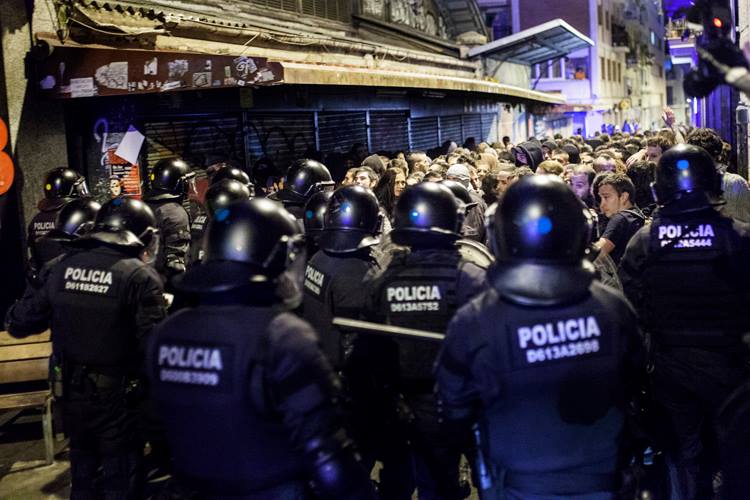
During the eviction that Monday, two courageous people resisted for more than 8 hours until police finally managed to remove them from the vault of the former bank. Many community members spent the day in the nearest square showing their support but unable to intervene directly because the police had blocked off streets all around the building. A helicopter materialized overhead. The chopping blades would become a soundtrack for the following days of dissent.
In the evening, after the police had sealed the façade with sheet metal and left, nearly two thousand people gathered and marched through the neighborhood, decrying the forceful seizure in various chants—“The Banc Expropiat stays in Gràcia!” “Our best weapon: solidarity!” The massive group ended up in front of the Banc, protesting with a thunderous roar created by rapping on the metal sheets and yelling.
As soon as hooded squatting activists began their attempt to cut open the entrance with a circular saw, swarms of police vans arrived and heavily armed officers spilled out, their faces, bodies, and nameplates covered in black. Demonstrators threw whatever they could get their hands on at the cops and made barricades with containers on fire. Chaos and destruction ensued. Encouragement from shop owners and neighbors on their balconies quickly turned to closed shutters as foam-tipped rubber bullets from the baton-wielding police chased stampedes of protesters through the narrow streets. By the end of the night, Gràcia was covered in smoldering overturned dumpsters and broken glass.
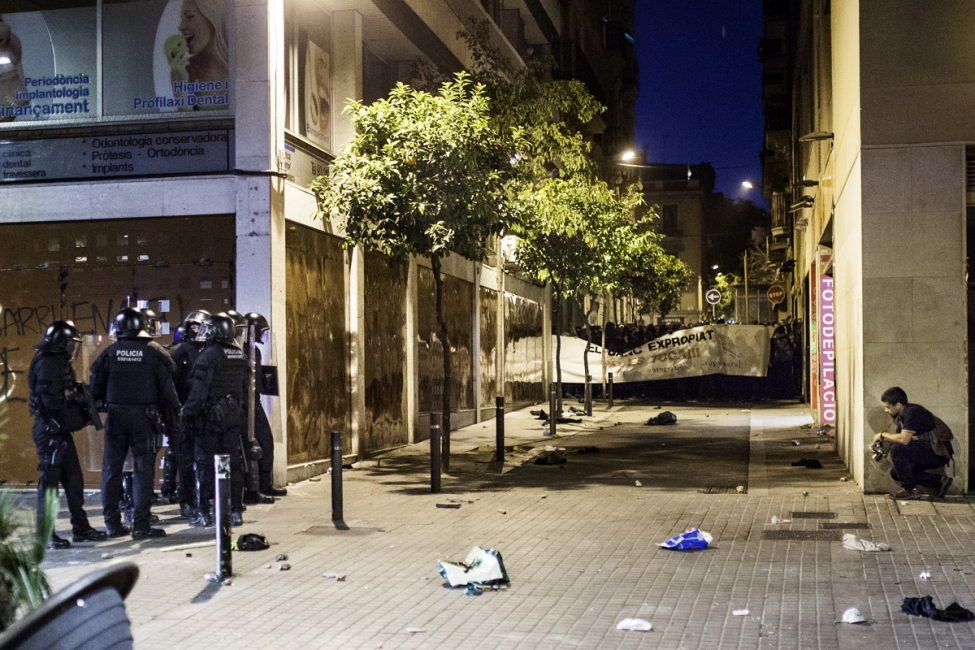
Tuesday, we demonstrated again. This time some 2,400 marching, chanting protesters returned to the site unobstructed and a small group of activists held up a banner at the entrance as others hidden behind it went to work cutting open the metal sheets. Moments after the Banc was reopened, dozens of police vans again appeared from all sides. Cops poured out and attacked unprovoked, swinging their nightsticks at everyone in a vicious charge to retake the space and then disperse the crowd. Rather than stopping the officers from exercising their right to strike, putting one’s hands in the air exposed vital organs to being whacked by a baton.
We had lost our right to assemble completely. Militarized police broke up any gathering of people in the neighborhood up to a kilometer from the contested area. At the end of the night, they had re-sealed the Banc with a much stronger steel plate where the ephemeral door had stood.
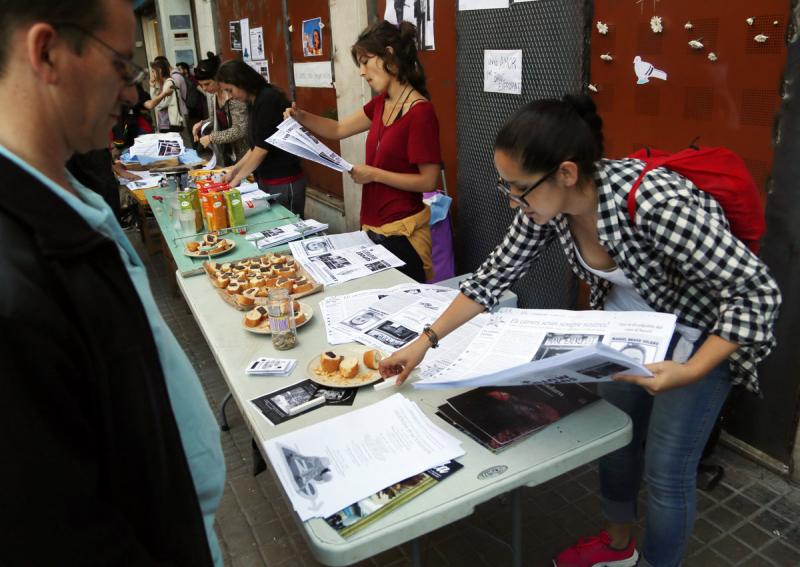
Wednesday concluded three consecutive nights of protest with a march that circled the Banc, which 580 police officers had been deployed to defend. Thursday was a day of reflection and planning for a weekend full of gathering support and momentum toward returning to our locale. On Friday, in front of the sealed space, we provided passersby with first-hand information and bread with chocolate. On Saturday, we set up the activities that used to take place at the Banc in the nearby square for all to participate: an improvised free shop of newly donated clothes, screen printing pro-Banc flags and T-shirts, all-level language classes, a gigantic meal of recycled food, an open mic for inspired poetry and music, and more. Sunday, police again thwarted plans to return to the Banc. About three dozen vans and the helicopter were already patrolling Gràcia before the mid-day demo. In the afternoon, reinforcements showed up. Tension remained high all day as demonstrators yelled at the police to get out of their neighborhood, their streets.
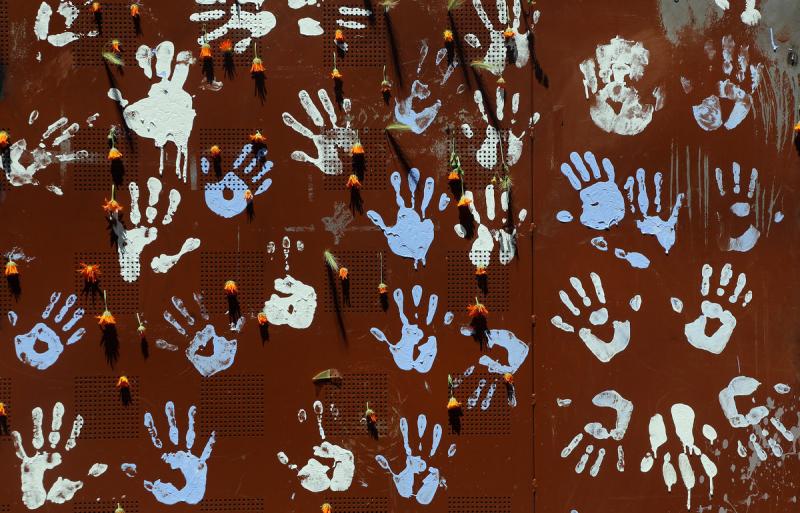
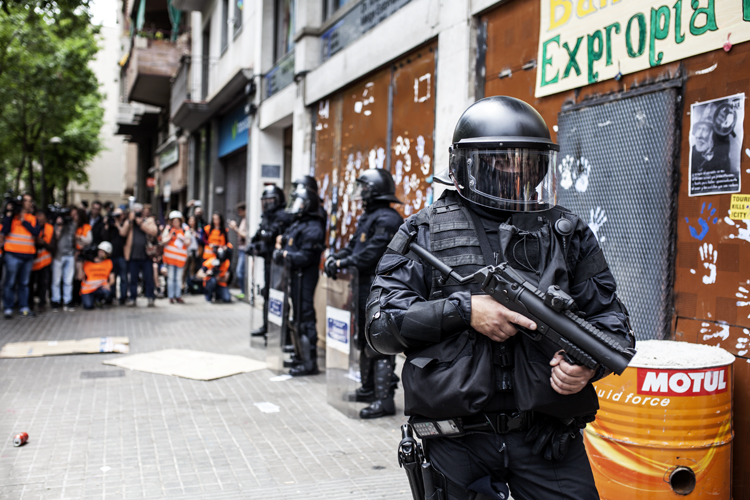
Today, two weeks after the eviction, the site remains sealed. The day-to-day meetings and classes of the Banc continue in the street. Supporters periodically stick flowers in the perforations of the metal sheets. Neighborhood associations, independent publishers, labor unions, feminist groups, and other social collectives from all over Barcelona and beyond show their support by spreading the word, raising funds for the anti-eviction campaign, and persistently bringing their energy to Gràcia for events and demonstrations. The mainstream media spins yarns about chaos-creating anarchists wreaking havoc on the neighborhood. Surely the authorities keep a close eye on the area.
‘Anti-disturbance’ squads and undercover cops injured 67 people during those first two days of resistance. The Catalan government pays these police officers to forcefully prevent us from reopening a social center, because the right of a real estate speculator to determine the fate of a privately owned property he will never directly use is legitimate, and the right of citizens to gather in unused space to create community-led projects for social transformation is apparently illegitimate. The Banc is a commons—a resource collaboratively managed by everyone, for everyone. Together we will continue to resist and reclaim the Banc Expropiat as a shared space, not a commodity for profit.
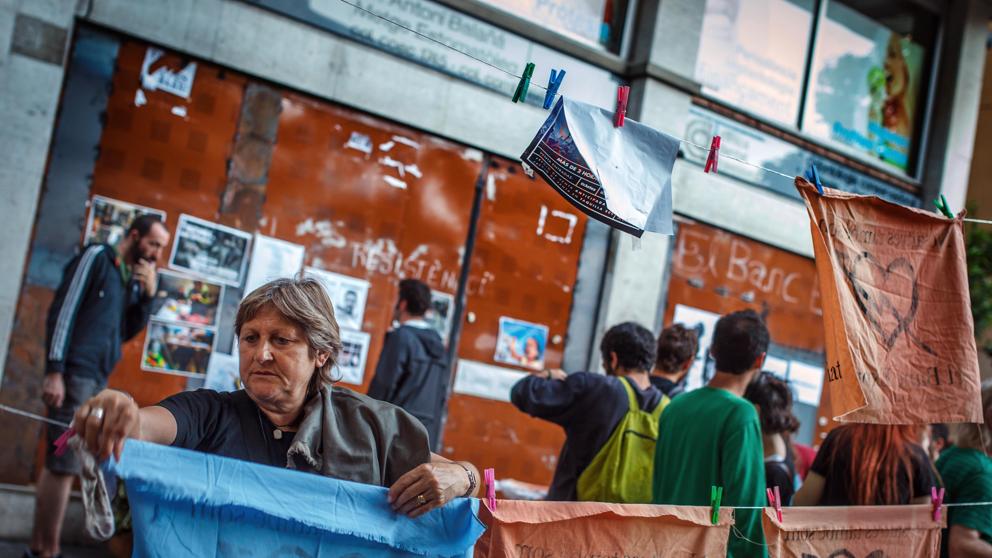
Update
The morning of Saturday, June 4th, the twitter account of the Banc Expropiat unexpectedly announced that five people had re-entered the space. No demonstration or event had been announced publicly or discussed digitally. Dozens of Gràcia residents began to gather around the Banc and the police soon followed, of course. With the brown, sheet-metal façade perfectly intact and purposefully confusing rumors swirling in the twittersphere, neither the police nor anyone else knew for certain if the news of reoccupation was real or fake. After clearing the area by force and hesitantly lingering outside the Banc for several minutes, the police officers sliced open one of the sheets, broke the glass, and clambered in. By late afternoon, the five occupants had been detained and more than one thousand demonstrators marched once more—“If they evict us today, we will be back tomorrow.”
Born and raised in Barcelona, Marina Rubio Herranz is working toward building harmonious and empowering ways of inhabiting this world through rehabilitation, permaculture, participation and mutual support.
Sam Bliss rode his bicycle from his parents’ house in Seattle to Catalunya to study ecological economics and degrowth at the Universitat Autònoma de Barcelona, and quickly got involved with several local groups and collectives.
To receive our next article by email, click here.